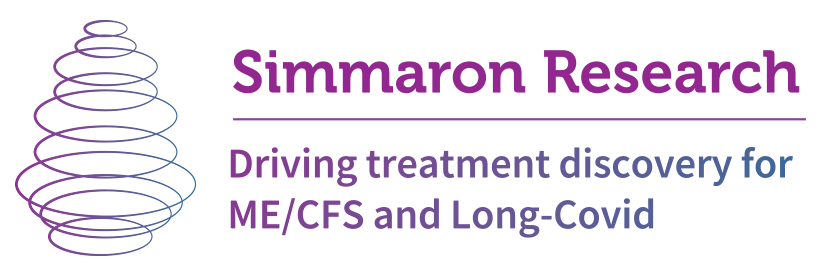Simmaron Scientist Awarded NIH Grant Probing Cause of Immune Holes in Chronic Fatigue Syndrome/Myalgic Encephalomyelitis
NIH Grant to Study Genetics of Immune Response in ME/CFS
Simmaron Research Foundation's Scientific Director, Isabel Barao PhD, has been awarded the IDeA Clinical and Translational Research Pilot Grant (CTR-IN) from the National Institutes of Health (NIH) to examine ways ME/CFS patients' genetic heritage may contribute to immune dysfunction and their inability to fight off viruses. Dr. Peterson will select the patients, collect their blood and provide their clinical information. The laboratory work will be performed at University of Nevada School of Medicine (UNSOM), Department of Microbiology and Immunology, where Dr. Barao is academically affiliated. The $75,000 grant is small, but it is an important sign of Simmaron's ability to advance new investigators involved in immunological research on ME/CFS at the NIH. The CTR-IN grant is supported by the National Institute of General Medical Sciences. The 1-year grant supports 20% of Dr. Barao's pay and supplies for laboratory work.Dr. Barao has also submitted an R21 grant proposal to the NIH in collaboration with the National Cancer Institute (NCI), Dr. Peterson and UNSOM.ME/CFS is believed to be a multi-factorial disorder caused by a combination of one's genetic makeup, an environmental trigger such as a pathogen, and other factors. It's believed that 20-40% of the reason people came down with ME/CFS lies in their genes.Take away that genetic component and maybe that infection that never went away passes on through like every other cold did. Maybe that bout of fatigue that stayed and got worse resolves with rest this time. It may take one factor to tip the system into the situation we call ME/CFS. That factor could lie in our genes.
The $75,000 grant is small, but it is an important sign of Simmaron's ability to advance new investigators involved in immunological research on ME/CFS at the NIH. The CTR-IN grant is supported by the National Institute of General Medical Sciences. The 1-year grant supports 20% of Dr. Barao's pay and supplies for laboratory work.Dr. Barao has also submitted an R21 grant proposal to the NIH in collaboration with the National Cancer Institute (NCI), Dr. Peterson and UNSOM.ME/CFS is believed to be a multi-factorial disorder caused by a combination of one's genetic makeup, an environmental trigger such as a pathogen, and other factors. It's believed that 20-40% of the reason people came down with ME/CFS lies in their genes.Take away that genetic component and maybe that infection that never went away passes on through like every other cold did. Maybe that bout of fatigue that stayed and got worse resolves with rest this time. It may take one factor to tip the system into the situation we call ME/CFS. That factor could lie in our genes.
First Line of Immune Defense Down
This grant will help determine if altered FcRs (e.g. CD16) on natural killer (NK) cells have made it more difficult for ME/CFS patients t0 fight off viruses. NK cells are the cells our immune system uses to hold the invader at bay while cytotoxic T-cells and B-cells gear up to wipe out the invader.We know that poorly functioning NK cells could be allowing pathogens to get entrenched more deeply into ME/CFS patients' systems, perhaps even into immunologically privileged parts of our nervous system that the big guns of our immune system have trouble getting to.
Second Line of Immune Defense Down As Well?
 It turns out, though, that natural killer cells not only play a vital role in the first lines of our immune defense – they also play an important role in fighting off chronic infections. This study suggests NK cell problems in ME/CFS may also be allowing chronic viral infections to persist.During an infection, B-cells start pumping out IgG antibodies that attach to and stop pathogens from infecting our cells. Once IgG antibodies have attached to a pathogen, NK cells are able to recognize, attack and kill cells infected with pathogens through FcRs, using a process called ‘antibody-dependent cell-mediated cytotoxicity’ (ADCC).Studies have shown that individuals with genetic alterations (polymorphisms) of the genes associated with that ADCC response have an increased risk of cancer and autoimmune disorders. Genetic impairment of the ADCC response could also make it more difficult to clear herpes viral infections, which are of such interest in ME/CFS.
It turns out, though, that natural killer cells not only play a vital role in the first lines of our immune defense – they also play an important role in fighting off chronic infections. This study suggests NK cell problems in ME/CFS may also be allowing chronic viral infections to persist.During an infection, B-cells start pumping out IgG antibodies that attach to and stop pathogens from infecting our cells. Once IgG antibodies have attached to a pathogen, NK cells are able to recognize, attack and kill cells infected with pathogens through FcRs, using a process called ‘antibody-dependent cell-mediated cytotoxicity’ (ADCC).Studies have shown that individuals with genetic alterations (polymorphisms) of the genes associated with that ADCC response have an increased risk of cancer and autoimmune disorders. Genetic impairment of the ADCC response could also make it more difficult to clear herpes viral infections, which are of such interest in ME/CFS.
A Talk With Isabel Barao Ph.D
Dr. Barao is Adjunct Assistant Professor at UNR's Department of Microbiology and Immunology and Scientific Director of Simmaron Research.How did you get involved in ME/CFS research? In 2009, the Whittemore Peterson Institute (WPI) invited me to be their scientific consultant and to find out why NK cells are dysfunctional in CFS. I conducted immunological studies at the WPI until September of 2010.What has your research into ME/CFS told you about this disease thus far?  I believe that variations in particular genes that affect the functioning of the immune system increase the risk of CFS.You recently presented a paper at the 1st Annual Mountain West CTR-IN meeting suggesting that ME/CFS patients may have higher than normal levels of "hybrid" immune cells. Can you tell us what those immune cells are and what effects they might have?The ‘hybrid’ lymphocytes are NKT-like cells that are increased in the blood of some of Dr. Peterson's CFS patients and that may have unique properties in CFS patients.We are characterizing these immune cells further.
I believe that variations in particular genes that affect the functioning of the immune system increase the risk of CFS.You recently presented a paper at the 1st Annual Mountain West CTR-IN meeting suggesting that ME/CFS patients may have higher than normal levels of "hybrid" immune cells. Can you tell us what those immune cells are and what effects they might have?The ‘hybrid’ lymphocytes are NKT-like cells that are increased in the blood of some of Dr. Peterson's CFS patients and that may have unique properties in CFS patients.We are characterizing these immune cells further.
You’re also engaged in a Simmaron Research Foundation study examining genetic changes in a range of immune cells in ME/CFS. Most ME/CFS research has focused on natural killer cells but you’re also really interested in other immune cells. Why? Because NK cells communicate with B cells, T cells, macrophages, etc. and if the communication between them is defective, immune deregulations involving all these cells can occur and lead to disease. What comes next and what are the treatment implications if the study is positive?Our expectations are that FcRs polymorphisms define CFS and its severity and predict those patients who may benefit from ADCC-based therapies.Read more about Isabel's work at Simmaron Research Foundation Study Targeting Roots of Immune System Breakdown in Chronic Fatigue Syndrome (ME/CFS)

